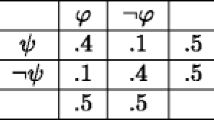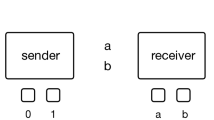Abstract
Bayesian probability is normally defined over a fixed language or eventspace. But in practice language is susceptible to change, and thequestion naturally arises as to how Bayesian degrees of belief shouldchange as language changes. I argue here that this question poses aserious challenge to Bayesianism. The Bayesian may be able to meet thischallenge however, and I outline a practical method for changing degreesof belief over changes in finite propositional languages.
Similar content being viewed by others
References
Binder, J., Koller, D., Russell, S., and Kanazawa, K., 1997, “Adaptive probabilistic networks with hidden variables,” Machine Learning 29, 213–244.
Carnap, R., 1950, Logical Foundations of Probability, London: Routledge & Kegan Paul (second edition 1962).
Carnap, R., 1971, “A basic system of inductive logic part 1,” pp. 33–165 in Studies in Inductive Logic and Probability, Vol. 1, R. Carnap and R.C. Jeffrey, eds., Berkeley, CA: University of California Press.
Christensen, D., 2000, “Diachronic coherence versus epistemic impartiality,” The Philosophical Review 109, 349–371.
Corfield, D., 2001, “Bayesianism in mathematics,” pp. 175–201 in Foundations of Bayesianism, D. Corfield and J. Williamson, eds., Dordrecht: Kluwer Academic Publishers.
Cowell, R.G., Dawid, A.P., Lauritzen, S.L., and Spiegelhalter, D.J., 1999, Probabilistic Networks and Expert Systems, Berlin: Springer-Verlag.
Cristianini, N. and Shawe-Taylor, J., 2000, Support Vector Machines and Other Kernel-Based Learning Methods, Cambridge: Cambridge University Press.
Earman, J., 1992, Bayes or Bust?, Cambridge, MA: MIT Press.
de Finetti, B., 1937, “Foresight. Its logical laws, its subjective sources,” pp. 53–118 in Studies in Subjective Probability, H.E. Kyburg and H.E. Smokler, eds., London: Wiley [1964].
Forster, M.R., 1995, “Bayes and bust: Simplicity as a problem for a probabilist's approach to confirmation,” British Journal for the Philosophy of Science 46, 399–324.
Forster, M. and Sober, E., 1994, “How to tell when simpler, more unified, or less ad hoc theories will provide more accurate predictions,” British Journal for the Philosophy of Science 45, 1–35.
Frege, G., 1880, “Boole's logical calculus and the concept-script,” pp. 9–52 in Posthumous Writings – Gottlob Frege, H. Hermes, F. Kambartel, and F. Kaulbach, eds., Oxford: Blackwell [1979].
Gaifman, H. and Snir, M., 1982, “Probabilities over rich languages,” Journal of Symbolic Logic 47, 495–548.
Gärdenfors, P., 1990, “The dynamics of belief systems: foundations versus coherence theories,” Revue Internationale de Philosophie 44, 24–46.
Gillies, D., 1991, “Intersubjective probability and confirmation theory,” British Journal for the Philosophy of Science 42, 513–533.
Gillies, D., 1996, Artificial Intelligence and Scientific Method, Oxford: Oxford University Press.
Gillies, D., 2001, “Bayesianism and the fixity of the theoretical framework,” pp. 363–379 in Foundations of Bayesianism, D. Corfield and J. Williamson, eds., Dordrecht: Kluwer Academic Publishers.
Goldstick, D., 1971, “Methodological conservatism,” American Philosophical Quarterly 8, 186–191.
Goodman, N., 1954, Fact, Fiction and Forecast, fourth edition, Harvard: Harvard University Press.
Halpern, J.Y. and Koller, D., 1995, “Representation dependence in probabilistic inference,” pp. 1853–1860 in Proceedings of the 14th International Joint Conference on Artificial Intelligence (IJCAI 95), C.S. Mellish, ed., San Francisco, CA: Morgan Kaufmann Publishers.
Harman, G., 1986, Change in View: Principles of Reasoning, Cambridge, MA: MIT Press.
Hausser, R., 1999, Foundations of Computational Linguistics, Berlin: Springer-Verlag.
Hilpinen, R., 1975, “Carnap”s new system of inductive logic,” pp. 333–359 in Rudolf Carnap, Logical Empiricist: Materials and Perspectives, J. Hintikka, ed., Dordrecht: D. Reidel.
Howson, C., 1976, “The development of logical probability,” pp. 277–298 in Essays in Memory of Imre Lakatos, R.S. Cohen, P.K. Feyerabend, and M.W. Wartofsky, eds., Boston Studies in the Philosophy of Science, Dordrecht: D. Reidel.
Howson, C., 1997, “Bayesian rules of updating,” Erkenntnis 45, 195–208.
Howson, C., 2001, “The logical basis of uncertainty,” pp. 137–159 in Foundations of Bayesianism, D. Corfield and J. Williamson, eds., Dordrecht: Kluwer Academic Publishers.
Howson, C. and Peter Urbach, P., 1989, Scientific Reasoning: The Bayesian Approach, Chicago, IL: Open Court (second edition, 1993).
James, W., 1907, “What pragmatism means,” pp. 141–158 in Essays in Pragmatism by William James, A. Castell, ed., New York: Hafner [1948].
Jaynes, E.T., 1973, “The well-posed problem,” Foundations of Physics 3, 477–492.
Jaynes, E.T., 1998, “Probability theory: The logic of science,” http:// bayes.wustl.edu/
Jim, K.-C. and Giles, C.L., 2000, “Talking helps: Evolving communicating agents for the predatorprey pursuit problem,” Artificial Life 6, 237–254.
Kakas, A.C., Kowalski, R., and Toni, F., 1998, “The role of abduction in logic programming,” pp. 235–324 in Handbook of Logic in Artificial Intelligence and Logic Programming 5, D.M. Gabbay, C.J. Hogger, and J.A. Robinson, eds., Oxford: Oxford University Press.
Kuhn, T.S., 1962, The Structure of Scientific Revolutions, Chicago, IL: University of Chicago Press (second edition, 1970).
Kvasz, L., 2000, “Changes of language in the development of mathematics,” Philosophia Mathematica 8, 47–83.
Kwoh, C.-K. and Gillies, D.F., 1996, “Using hidden nodes in Bayesian networks,” Artificial Intelligence 88, 1–38.
Lakatos, I., 1968, “Changes in the problem of inductive logic,” pp. 315–417 in The Problem of Inductive Logic, Proceedings of the International Colloquium in the Philosophy of Science, London, 1965, Vol. 2, I. Lakatos, ed., Amsterdam: North-Holland.
Laudan, L., 1981, “A confutation of convergent realism,” Philosophy of Science 48, 19–48.
Lauritzen, S.L. and Spiegelhalter, D.J., 1988, “Local computation with probabilities in graphical structures and their applications to expert systems,” (with discussion) Journal of the Royal Statistical Society B 50, 157–254.
Lehrer, K., 1974, Knowledge, Oxford: Clarendon Press.
Lehrer, K., 1978, “Why not scepticism?,” pp. 346–363 in Essays on Knowledge and Justification, G. Pappas and M. Swain, eds., Ithaca, NY: Cornell University Press.
Lycan, W.G., 1988, Judgement and Justification, Cambridge: Cambridge University Press.
Magnani, L., 2001, Abduction, Reason, and Science: Processes of Discovery and Explanation, Dordrecht: Kluwer Academic Publishers/Plenum Publishers.
Muggleton, S. and de Raedt, L., 1994, “Inductive logic programming: theory and methods,” Journal of Logic Programming 19–20, 629–679.
Nagel, E., 1963, “Carnap's theory of induction,” pp. 785–825 in The Philosophy of Rudolf Carnap, P.A. Schilpp, ed., Chicago, IL: Open Court.
Neapolitan, R.E., 1990, Probabilistic Reasoning in Expert Systems: Theory and Algorithms, New York: Wiley.
Paris, J.B., 1994, The Uncertain Reasoner's Companion, Cambridge: Cambridge University Press.
Paris, J.B. and Vencovská, A., 1997, “In defense of the maximum entropy inference process,” International Journal of Automated Reasoning 17, 77–103.
Paris, J.B. and Vencovská, A., 2001, “Common sense and stochastic independence,” pp. 203–240 in Foundations of Bayesianism, D. Corfield and J. Williamson, eds., Dordrecht: Kluwer Academic Publishers.
Pearl, J., 1988, Probabilistic Reasoning in Intelligent Systems: Networks of Plausible Inference, San Mateo, CA: Morgan Kaufmann.
Polya, G., 1954, Patterns of Plausible Inference, Mathematics and Plausible Reasoning, Vol. 2, Princeton, NJ: Princeton University Press.
Putnam, H., 1963, “‘Degree of confirmation’ and inductive logic,” pp. 761–783 in The Philosophy of Rudolf Carnap, P.A. Schilpp, ed., Chicago, IL: Open Court.
Quine, W.V.O., 1960, Word and Object, Cambridge, MA: MIT Press and New York: John Wiley.
Ramsey, F.P., 1926, “Truth and probability,” pp. 23–52 in Studies in Subjective Probability, H.E. Kyburg and H.E. Smokler, eds., London: Wiley [1964].
Rosenkrantz, R.D., 1977, Inference, Method and Decision: Towards a Bayesian Philosophy of Science, Dordrecht: D. Reidel.
Ross, L. and Anderson, C.A., 1982, “Shortcoming in the attribution process: on the origins and maintenance of erroneous social assessments,” pp. 129–152 in Judgements under Uncertainty: Heuristics and Biases, D. Kahneman, P. Slovic, and A. Tversky, eds., Cambridge: Cambridge University Press.
Rott, H., 1999, “Coherence and conservatism in the dynamics of belief,” Erkenntnis 50, 387–412.
Shimony, A., 1955, “Coherence and the axioms of confirmation,” Journal of Symbolic Logic 20, 1–28.
Sklar, L., 1975, “Methodological conservatism,” Philosophical Review 84, 374–400.
Sober, E., 1975, Simplicity, Oxford: Oxford University Press.
Spirtes, P., Glymour, C., and Scheines, R., 1993, Causation, Prediction, and Search, Cambridge, MA: MIT Press (second edition, 2000).
Thagard, P., 1988, Computational Philosophy of Science, Cambridge, MA: MIT Press.
Vapnik, V.N., 1995, The Nature of Statistical Learning Theory, Berlin: Springer-Verlag (second edition, 2000).
Williams, P.M., 1980, “Bayesian conditionalisation and the principle of minimum information,” British Journal for the Philosophy of Science 31, 131–144.
Williamson, J., 1999, “Countable additivity and subjective probability,” British Journal for the Philosophy of Science 50, 401–416.
Williamson, J., 2001a, “Abduction and its distinctions,” Review of “Abduction, Reason, and Science: Processes of Discovery and Explanation” by L. Magnani, British Journal for the Philosophy of Science, to appear.
Williamson, J., 2001b, “Machine Learning and the Philosophy of Science: a Dynamic Interaction,” pp. 1–12 in Proceedings of the ECML-PKDD-01 Workshop on Machine Learning as Experimental Philosophy of Science, Freiburg, K. Korb and H. Bensusan, eds.
Williamson, J., 2002a, “Probability logic,” pp. 397–424 in Handbook of the Logic of Argument and Inference: The Turn Toward the Practical, D. Gabbay, R. Johnson, H.J. Ohlbach, and J. Woods, eds., Amsterdam: Elsevier.
Williamson, J., 2002b, “Maximising entropy efficiency,” Electronic Transactions in Artificial Intelligence, to appear.
Author information
Authors and Affiliations
Rights and permissions
About this article
Cite this article
Williamson, J. Bayesianism and Language Change. Journal of Logic, Language and Information 12, 53–97 (2003). https://doi.org/10.1023/A:1021128011190
Issue Date:
DOI: https://doi.org/10.1023/A:1021128011190




